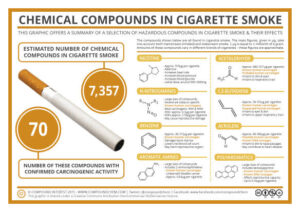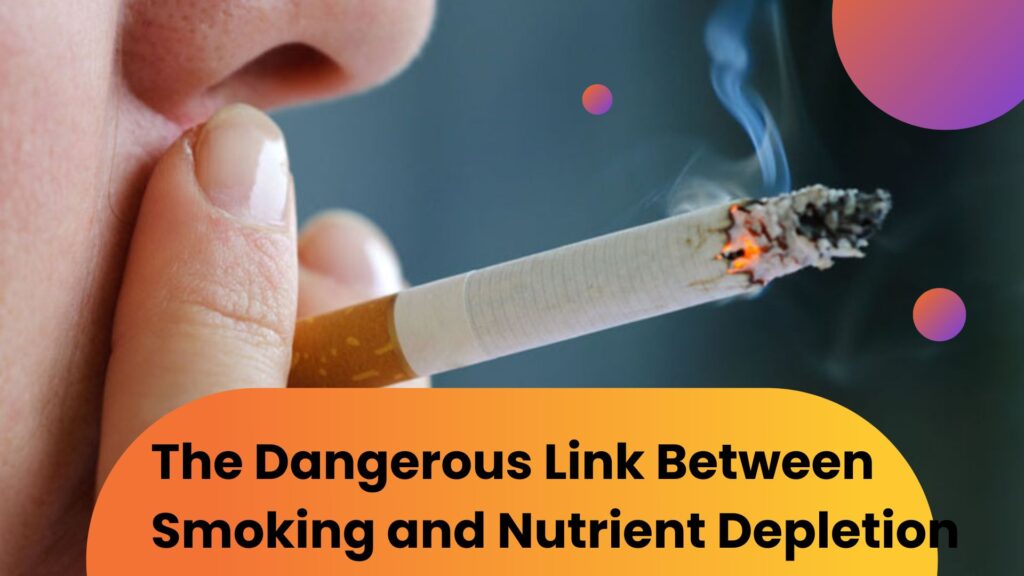Table of Contents
Introduction
Smoking and Nutrient Depletion. Smoking is a major risk factor for many health problems, including cancer, heart disease, stroke, and lung diseases. But did you know that smoking can also deplete the body of nutrients?
Cigarette smoke contains over 7,000 chemicals, including many that are known to be harmful to cells. These chemicals can damage cells and make it difficult for them to absorb nutrients. As a result, smokers are often deficient in important nutrients such as vitamin C, vitamin E, folate, and beta-carotene.
For example, vitamin C is an important antioxidant that helps protect cells from damage. Smoking can reduce levels of vitamin C in the body, making it more vulnerable to damage from free radicals. This can increase the risk of cancer, heart disease, and other chronic diseases.
Another important nutrient that can be depleted by smoking is folate. Folate is essential for cell growth and DNA repair. Smoking can reduce levels of folate in the body, which can increase the risk of birth defects in babies born to mothers who smoke.
Why you should know about smoking and nutrient depletion?

It is a fact that smoke contains several toxic chemicals which makes its into the body and causes several chronic diseases.
There is no food ingredient of any kind the body through cigarette smoke. It can be called as non dietary causes of chronic diseases. By knowing how smoke affects our body and causes these diseases could throw more light on the root cause of chronic diseases.
Why nutrient depletion? It is a well known fact that our body has several antioxidant nutrients like vitamin C, E, beta carotene, glutathione, selenium, zinc etc. Whenever some endogenous free radicals are generated our body uses these antioxidants to neutralize them. This way it protects our cells from getting damaged and helps the cells perform their functions properly.
The abundance of free radicals in cigarette smoke may induce oxidative stress in the respiratory and circulatory systems, and the lower concentrations of antioxidants found in smokers may be due to a sustained smoke-related oxidant load that depletes the the antioxidants [ Monitoring micronutrients in cigarette smokers: https://www.sciencedirect.com/science/article/abs/pii/S0009898106005948?]
Lower concentrations of various antioxidant nutrients could be one of the root cause of chronic diseases. Deficiency of these nutrients may affect the functioning of the cells.
How to prevent nutrient depletion?
Quitting smoking is the only way to prevent depletion of nutrients. There are several quit smoking aids that can help you quit smoking. Check my article best natural quit smoking aids.
You can change your lifestyle. For this you need to work on your behavioral risk factors, which can be modified.
List of antioxidants present in the body
Several micronutrients are important antioxidants and play a very important role in the body.
Firstly, they protect us against endogenous oxidant stress. Secondly, they protect us from the oxidative stress caused by smoking.
Many studies of cigarette smokers, however, have found they have lower intakes and lower blood concentrations of certain antioxidants and other micronutrients, e.g., vitamin C, β-carotene, and folat.
list of antioxidants present in our body:
- Vitamin C is a water-soluble antioxidant that scavenges free radicals in the aqueous part of the cell, e.g., the cytoplasm.
- Vitamin E is the major scavenger of free radicals in the lipid phase, e.g., cell membranes.
- The antioxidant function of β-carotene depends on the oxygen tension in the microenvironment of the cell.
- Carotenoids are efficient quenchers of singlet oxygen and can directly scavenge free radicals and inhibit lipid peroxidation.
- Selenium is a cofactor for glutathione peroxidase (GSHPx), an important antioxidant enzyme for removing lipid hydroperoxides and hydrogen peroxide.
- Zinc, copper, and iron also have important roles in the body’s enzymatic antioxidant defence systems.
- Folate, vitamins B6 and B12 are involved in the regulation of homocysteine and elevation of homocysteine is identified as an independent risk factor for cardiovascular disease (CVD).
What is endogenous antioxidant stress?
Endogenous antioxidant stress is a condition in which the body’s own antioxidant defenses are overwhelmed by the production of free radicals. Free radicals are unstable molecules that can damage cells and tissues.
Antioxidants are substances that help to protect cells from damage caused by free radicals.
Endogenous antioxidant stress can be caused by a number of factors, including:
Age: As we age, our bodies produce fewer antioxidants and are less able to remove free radicals from the body.
Dietary factors: Eating food that is deficient in nutrients. Eating less fruits and vegetables.
Eating foods like carbohydrates which are processed and sugary drinks. They lack the nutrients that are required for metabolizing them. When they burn in the mitochondria they produce ROS or free radicles.
Environmental factors: Exposure to toxins, such as pollution and cigarette smoke, can also increase the production of free radicals.
Endogenous antioxidant stress can lead to a number of health problems, including:
Heart disease: Free radicals can damage the walls of blood vessels, leading to plaque buildup and heart disease.
Cancer: Free radicals can damage DNA, which can lead to the development of cancer cells.
Neurodegenerative diseases: Free radicals can damage nerve cells, leading to diseases such as Alzheimer’s disease and Parkinson’s disease.
Aging: Free radicals can contribute to the aging
Why smokers need more Vitamin C?
Vitamin C is the main antioxidant in human beings. The RDA of 60mg/d is not sufficient for smokers. Therefore for smokers the RDA of AA has been increased to 100 mg/d.
A study was conducted by National Health and Nutrition Examination Survey (1976 – 1980) on 11,582 adults to find out how much ascorbic acid (AA) is needed by smokers to match with the AA levels of non-smokers. They found that only smokers consuming > 200 mg AA/d had serum ascorbate concentrations and risk of LoC equivalent to nonsmokers meeting the RDA.[Ascorbic acid requirements for smokers: analysis of a population survey https://www.sciencedirect.com/science/article/abs/pii/S0002916523173072?]
From this study we can conclude that depletion of vitamin C can cause chronic diseases. Micro nutrients play a very important role in helping the cells to perform their function properly.

